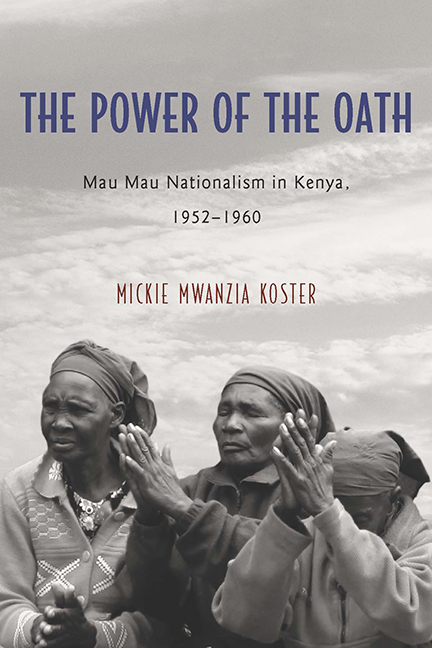5 - Gender and the Mau Mau Oath
Published online by Cambridge University Press: 07 May 2022
Summary
It [the Mau Mau oath] bonded us together with one aim.
—M. G. Kinyanjui, June 2015This chapter explicates the new gender to oath relationships during Mau Mau. As did many other women, Mwihaki Gauu Kinyanjui joined the Mau Mau and took the Mau Mau oath. In the above epigraph, Kinyanjui describes why she believed in the power of the Mau Mau oath. She states, “I fought for this nation; I was fighting for the truth.” However, this relationship did not always exist. In Kenya, precolonial politics and especially war were the important business of men; women were relegated to the domestic sphere. All political oath matters, such as kithitu oathing, were handled solely by adult men. Women were not allowed to have anything to do with the dangerous oath; if court disputes involved women, men had to oath on their behalf. Through the introduction of new laws, however, colonialism created new gender roles that were well-entrenched by the 1950s. Women seized new political spaces of freedom, including their eventual participation in Mau Mau oathing and the war. Interestingly, although the oath was once the sole domain of men, the Mau Mau rebellion—reclaiming African land for Africans against the British colonists—became a moment women embraced to recast gender boundaries and contribute to the politics of the country. Women not only oathed but also administered the oath to men, women, and children. Women were initially challenged by males who wanted to limit their participation to traditional support roles; however, Mau Mau women rose above stereotypes and restrictions to become valuable and respected fighting participants.
Women were major contributors in the Mau Mau freedom fight. Women's literature tends to present African women as victims but, in reality, African women have had a long history of agency and activism. In Kenya, we cannot forget leaders like Mekatilili Wa Menza who led the Giriama in early acts of resistance against British colonizers from 1913 to 1914. Women had reasons to oath and fight. The involvement of women in oath ceremonies created a major transformation of the oath.
- Type
- Chapter
- Information
- The Power of the OathMau Mau Nationalism in Kenya, 1952–1960, pp. 103 - 128Publisher: Boydell & BrewerPrint publication year: 2016



